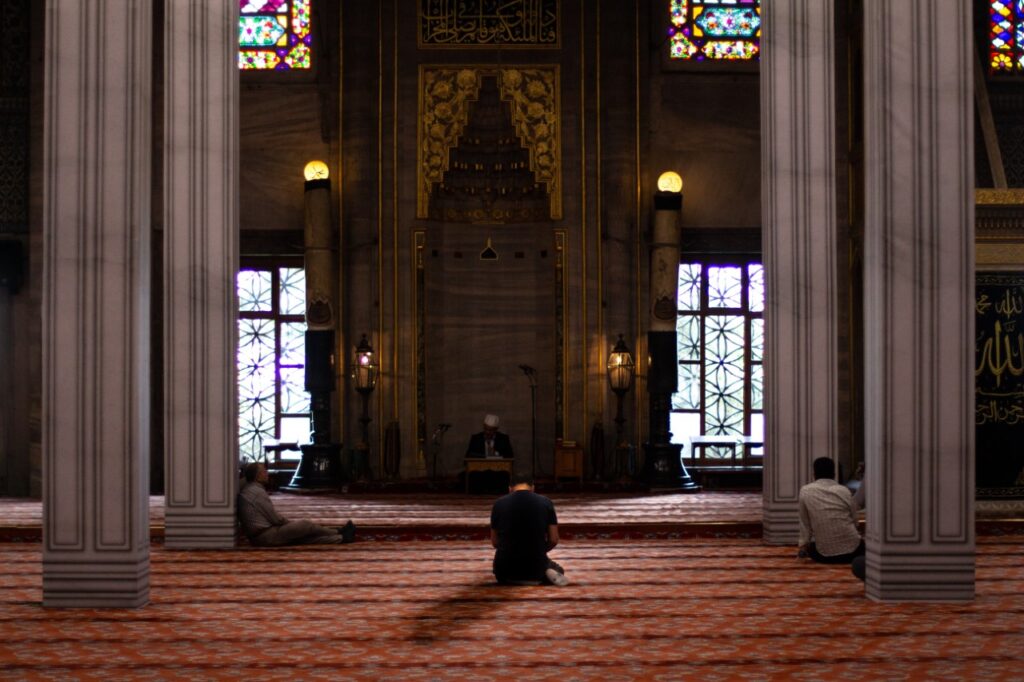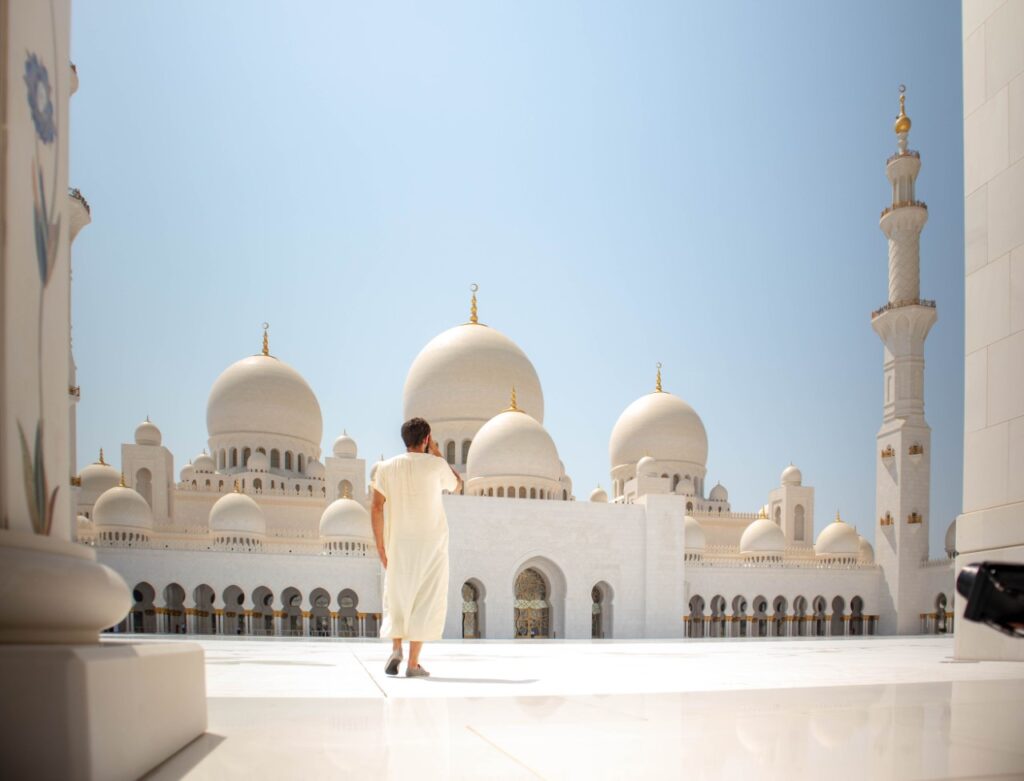By Katie Dominy, Middle East correspondent for The International
In times of uncertainty, countless millions across the world turn to their religious or spiritual beliefs to find solace. And so it should come as no surprise that the Middle East and North Africa (MENA), the birthplace of the world’s three major monotheistic religions, is no exception to that trend.
The region is known for how deeply spirituality permeates many areas of everyday life. From culture and social identity, to behavioural etiquette and legal codes, it isn’t difficult to spot the daily presence of religion in the MENA.
Globally, one of the most significant religious events of the year is the month of Ramadan, celebrated by the world’s approximately 1.8 billion Muslims. Statistics suggest that around 90% of the MENA’s 484 million inhabitants practise Islam. As such, Ramadan – the ninth month in the Islamic calendar – is the spiritual milestone of the year for many millions of people across this geographically vast region.
While You’re Here,
Why not take a moment to subscribe to The International’s free monthly newsletter? It takes seconds to sign up, and you’ll stay up to date with the stories shaping our world at a pace that won’t overwhelm.
Understanding Ramadan
In 2020, Ramadan ran from 23rd April until 23rd May (give or take a day or two depending on the country of worship). Ramadan commences with the first waxing crescent moon after a new moon, and marks the beginning of a month of prayer, fasting, and increased observation of Islamic principles. Muslims commemorate the Prophet Muhammad’s first revelation from God, and alter their daily routines and lifestyles to demonstrate their devotion. Observers are expected to refrain from eating and drinking (as well as smoking, sexual activity, and negative speech or behaviour) during daylight hours. The high points of each day are the meals, which are meant to be enjoyed with family, friends, and copious amounts of food. Suhoor, the pre-dawn meal, leads into morning prayers, and Iftar, the post-sunset meal which breaks the day’s fast, is a mammoth feast designed to bring people together. The end of Ramadan fasting ushers Eid al-Fitr, a joyous festival of prayer, collective spirit, and gift-giving.
Overall, the Ramadan experience is one of increased spiritual reflection, connection to God, and commitment to community. It is a time of moral consciousness, giving to those less fortunate (known as Zakat al-Fitr), and sharing with relatives and neighbours.

Photo credit: David Monje
Together, Alone
However, Ramadan 2020 had a very different feel. Due to the Covid-19 pandemic, both public and personal spheres of worship have been greatly affected. In Saudi Arabia, the Prophet’s Mosque in Medina and the Grand Mosque in Mecca (the two holiest sites in Islam) were closed for the entirety of Ramadan. It is a distinct possibility that July’s Hajj pilgrimage to Mecca (which attracts millions of Muslims to Saudi Arabia every year) will be cancelled. Al-Aqsa Mosque in Jerusalem (Islam’s third holiest site) was closed to the public. Countless mosques have followed suit throughout the region, from the Gulf states to Morocco. Leaders instructed citizens to stay at home in order to slow the spread of the virus. Curfews, lockdowns, and public restrictions are widespread. Saudi King Salman expressed regret for the effect of these actions: “It pains me to welcome the glorious month of Ramadan under circumstances that forbid us from prayers in mosques”. In a public address, Ayatollah Khamenei, Iran’s Supreme Leader, implored people to change their Ramadan practices: “In the absence of public gatherings during Ramadan, such as prayers, speeches … which we are deprived of this year, we should not neglect worship, invocation and humility in our loneliness”. Isolation (and its by-product, loneliness) are the order of the day – the unfortunate consequences of necessary public safeguarding.
So, the key question is: how have Muslims collectively participated in the holiest month of the year – a month of global fellowship, compassion, and spiritual awareness – when ‘togetherness’ is forbidden? For many, ‘Ramadan’ and ‘isolation’ are concepts that are completely incompatible. However, communities across the MENA found creative ways to maintain the spirit of Ramadan under lockdown.
Charitable Problem-Solving
Firstly, some managed to give charitably whilst minimising social contact. Across the region, hashtags such as ‘#Feed_Your_Brother’ have emerged, inspiring families to place Ramadan meals on their doorsteps for homeless people to collect safely. In the United Arab Emirates (UAE), charities delivered Iftar meals to the poor, instead of large meals being offered to crowds in community tents or mosques. In Cairo, volunteers appeared in their hundreds to take food to Egypt’s needy on donated bicycles. On a wider scale, national branches of the Red Crescent have been providing Covid-19 relief and hygiene supplies in countries such as Syria, Palestine, Iraq, Lebanon, and Iran.
Alaa Hamed (founder of an Egyptian homelessness movement) nicely summarised why charitable acts have continued even under Coronavirus’ exceptional circumstances: “Poverty is so widespread these days, there are people who will rummage through garbage to eat. But Ramadan brings out people’s kindness – everyone will do something to help.”

Photo credit: Artur Aldyrkhanov
Modern Faith
As well as lockdown-approved charity, another force helped transform Ramadan 2020: technological innovation. Communications platforms such as Zoom and Facebook Live facilitated virtual prayers and family Iftar dinners despite isolation. Some technology platforms went one step further, opting for Virtual Reality (VR) experiences. For example, Experience Mecca (created by BSocial in Cairo) launched a 2.0 version of their software in time for Ramadan. Users can experience the Grand Mosque and Kaaba in 3D using VR goggles, complete with call to prayer and the ability to engage with other ‘virtual pilgrims’.
In certain countries, such as Saudi Arabia and the UAE, Snapchat deployed specific Augmented Reality (AR) lenses to coincide with Ramadan. In collaboration with the World Health Organization (WHO), these lenses allow users to scan everyday objects to access an AR experience. The AR clips show how donations could help the WHO’s Coronavirus relief efforts. Users are then guided to the global donations page of the COVD-19 Solidarity Response Fund. Hussein Freijeh (General Manager of Snap Inc., Middle East) commented; “This campaign… comes as we are getting ready to welcome the holy month of Ramadan and celebrate the spirit of giving. We believe that everyone can play a meaningful role in stopping the spread of Covid-19, and that it is our responsibility to support initiatives that can make that happen.” Pilgrimage and acts of charity without even leaving your home? That sounds quarantine-approved.
Simple Comforts
Creativity, adaptability, and, in no small part, technology were important components of Ramadan 2020. In years to come, many Muslims in the MENA will not remember this Ramadan fondly. It will be remembered as the holy month without the usual sounds, colours, smells, hustle, and bustle.
However, despite its shortcomings, it is possible to appreciate even the simple stillness of this year’s Ramadan. Abu Ibrahim, a Syrian who fled the civil war and is now in Jordan, provides some sobering perspective: “People say, how are we going to get through this Ramadan when we can’t see each other, when there’s a health risk… We used to put food on the table and hear the sound of bombing. We were scared of death, of our families dying. Coronavirus doesn’t worry me. I’m in my house, with my family, we’re safe, we have electricity, phones, food”. Perhaps now, more than ever, it is life’s simplicities that provide the greatest comfort.
Katie Dominy is The International’s Middle East correspondent.
